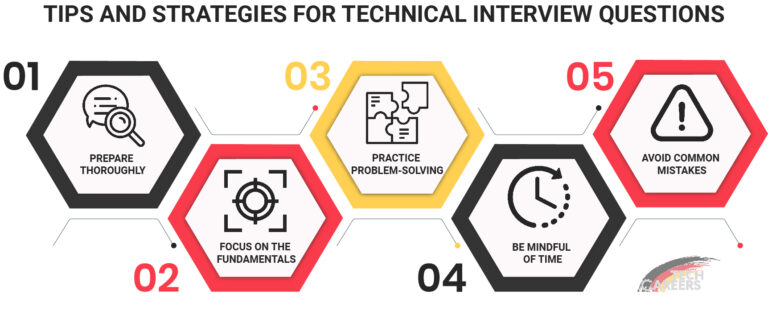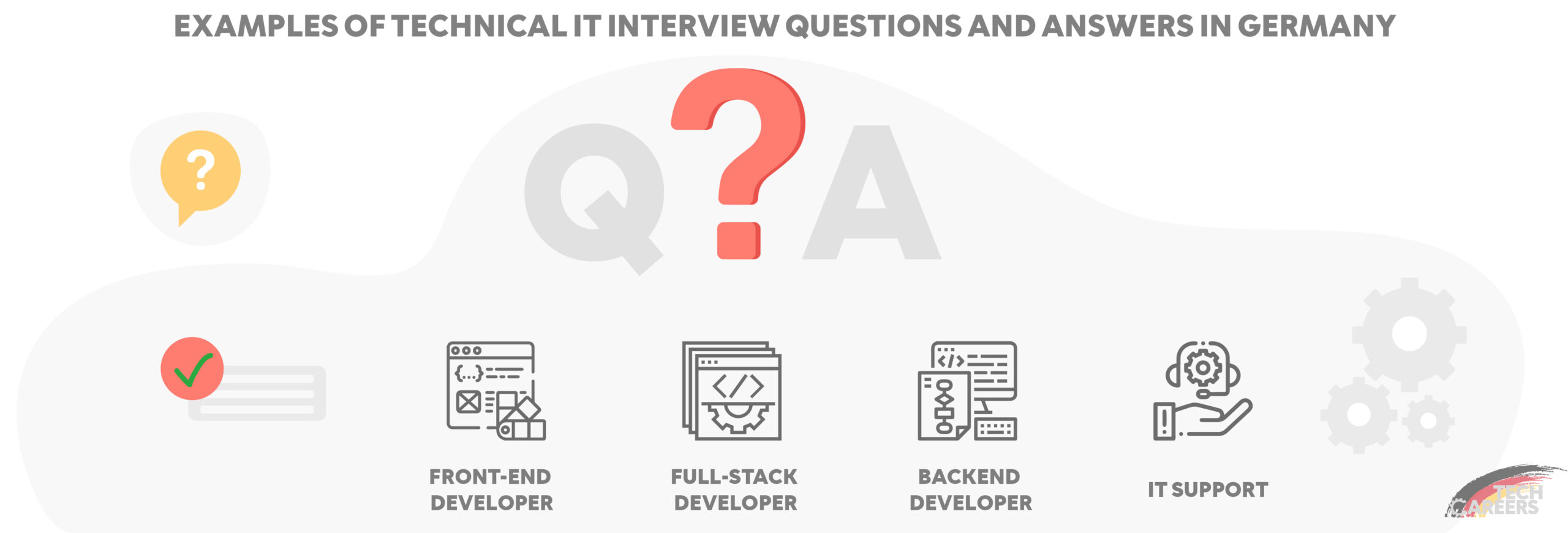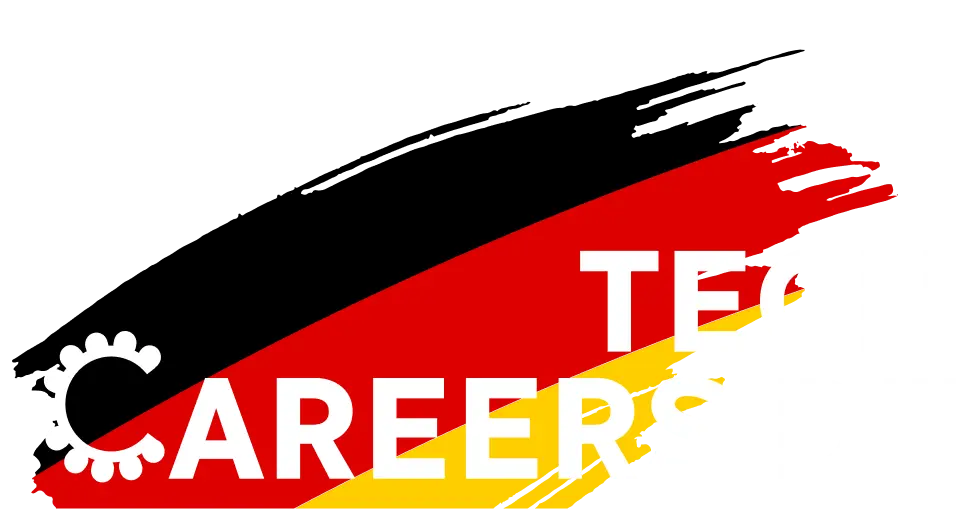
In the rapidly evolving world of technology, the demand for skilled IT professionals has never been higher. Germany, as a leading technological hub, is no exception to this trend. With its thriving technology sector, tech jobs Germany offers exciting opportunities for IT professionals looking to advance their careers and work on innovative projects.

Tech jobs in Germany are highly sought after, and landing one often starts with acing the specific technical interview. This crucial step in the hiring process is designed to assess a candidate’s knowledge, communication skills, and ability to solve real-world problems. With the right preparation and understanding of the most common IT interview questions, you can confidently navigate your job interview in Germany and secure your dream position.
When gearing up for an IT support role, it’s essential to familiarize yourself with IT support job interview questions to effectively demonstrate your knowledge and capabilities during the interview process. Additionally, exploring questions in German examples can help interviewer prepare for interviews conducted in German and enhance their readiness to communicate effectively in a multilingual workplace. Reviewing the job description carefully will also help you tailor your responses to align with the specific requirements and expectations of the role.
Overview of Common Interview Questions for Various IT Roles in Germany
Technical interviews in Germany typically focus on specific IT roles, so it’s essential to know what to expect for the position you’re targeting. Facing a job interview in German can be challenging, but with thorough preparation and practice, you can confidently demonstrate your language expertise and technical skills to secure your desired position. Here’s an overview of the most common HR interview questions in Germany for various roles:
- Front end developer interview questions: These questions often delve into HTML, CSS, JavaScript, and popular frameworks like React, Angular, or Vue.js. You might be asked to explain a specific concept or demonstrate your ability to implement a feature using a coding exercise.
- Full stack developer interview questions: In addition to front-end technologies, full-stack developers should be prepared to answer questions about back-end technologies such as databases, server-side languages like Python or Ruby, and web servers. Be ready to discuss your experience with both front-end and back-end systems and demonstrate your ability to work with the full stack.
- IT support technical questions: Preparing for your upcoming job interview? Don’t forget to review common IT support engineer interview questions to ensure you’re ready to showcase your technical knowledge and problem-solving skills. Interview questions for IT support usually focus on troubleshooting, networking, and hardware concepts. You might be asked about your experience with operating systems, tools for diagnosing network issues, and best practices for handling customer support situations. Familiarizing yourself with Germany interview questions and answers can help you tailor your responses to align with the expectations of German employers and increase your chances of success in the interview process.
- Senior Java developer interview questions: For this role, expect asked questions about advanced Java concepts, including multithreading, concurrency, and design patterns. You might also be asked about your experience with Java frameworks like Spring and Hibernate, as well as your familiarity with testing tools and methodologies.
- Web developer interview questions: These interview questions may cover a wide range of topics, from HTML and CSS to JavaScript and server-side programming languages. You might be asked to demonstrate your ability to create responsive designs or optimize web applications for performance.
- Backend developer interview questions: As a backend developer, you’ll likely be asked about server-side languages, databases, and API development. You might also be asked to demonstrate your knowledge of data structures, algorithms, and performance optimization techniques.
- IT manager interview questions: IT manager interview questions often revolve around team leadership, project management, and strategic planning. Be prepared to discuss your experience managing IT projects, setting priorities, and resolving conflicts within your team.
- IT consultant interview questions: For IT consultants, expect common questions about your ability to assess client needs, design and implement technology solutions, and manage project timelines. You might be asked to provide examples of successful projects or discuss your approach to managing client relationships.

Looking for an IT Specialist in Germany? We will help!
Submit your vacancy to our job list and get viewed by thousands of the best tech professionals in Germany from Berlin, Munich, Bavaria, Cologne, Dusseldorf, Hamburg, Frankfurt, and more!
Tips and Strategies for Answering Technical Interview Questions Effectively
Technical interviews can be challenging, but with the right preparation, you can navigate them effectively and showcase your skills and knowledge. Hiring managers often ask you questions that assess your problem-solving abilities, technical expertise, and how well you can apply your knowledge to real-world scenarios. To excel, it’s crucial to understand the types of queries you might encounter and practice with sample answers. By doing so, you can develop a structured approach to answering questions, ensuring that you address the key points and demonstrate your qualifications confidently.
- Prepare thoroughly: Research the company and the specific IT role you’re targeting. Understand the technologies and tools they use and be ready to demonstrate your proficiency in these areas.
- Focus on the fundamentals: Ensure you have a solid understanding of the core concepts related to your IT role. This foundation will help you effectively tackle more advanced questions and scenarios.
- Practice problem-solving: Technical interview in Germany often involves solving real-world problems or completing coding exercises. Practice your soft skills by working through relevant exercises and coding challenges.
- Be mindful of time: During the interview, manage your time effectively. If you’re unsure of an answer, it’s better to admit your uncertainty and discuss your thought process rather than waste time trying to guess.
- Avoid common mistakes: Common mistakes include not listening carefully to the question, failing to provide a clear and concise answer, or neglecting to discuss the trade-offs and considerations of your approach. Be attentive, articulate, and thoughtful in your responses.

Real-World Examples of 10 Common IT Interview Questions and Answers for Various IT Roles in Germany
Front-end Developer:
Question: How would you optimize a website’s performance?
Answer: I would use techniques such as minimizing HTTP requests, compressing files, enabling browser caching, minifying CSS and JavaScript files, optimizing images, and using a Content Delivery Network (CDN) to improve the website’s loading speed.
IT Support:
Question: How would you troubleshoot a slow computer?
Answer: I would first check for any hardware issues, such as insufficient RAM or hard drive space. Next, I would look for software-related issues, including outdated drivers, malware, or a high number of startup programs. I would also investigate the computer’s settings, including power management options and visual effects, to identify any potential optimizations.

Full-Stack Developer:
Question: Explain the difference between SQL and NoSQL databases.
Answer: SQL databases are relational databases that use structured query language (SQL) for data manipulation. They have a predefined schema and use tables to store data. NoSQL databases are non-relational and don’t use SQL for data manipulation. They have a dynamic schema and can store unstructured data in various formats such as key-value, document, column-family, or graph stores.
Backend Developer:
Question: What is the difference between a RESTful API and a GraphQL API?
Answer: A RESTful API follows a representational state transfer (REST) architecture and uses standard HTTP methods to interact with resources. It usually returns data in JSON or XML format. A GraphQL API, on the other hand, is a query language for APIs that allows the client to request only the data it needs, reducing over-fetching or under-fetching of data. GraphQL enables more precise control over data retrieval and manipulation.
Software Developer:
Question: Can you explain the concept of polymorphism in Object-Oriented Programming (OOP) and provide a real-world example?
Answer: Polymorphism is a core concept in OOP that allows objects of different classes to be treated as objects of a common superclass. It provides the ability to call the same method on different objects and have each of them respond in their own way. For example, consider a base class Animal with a method makeSound(). Different subclasses like Dog and Cat can override this method to produce different sounds.
Network Engineer:
Question: Describe the OSI model and explain how data flows from one computer to another across a network.
Answer: The OSI model (Open Systems Interconnection) is a conceptual framework used to understand and implement network protocols in seven layers.
Data Scientist:
Question: How would you handle missing data in a dataset?
Answer: Handling missing data depends on the context and the amount of missing data. Some common methods include:
- Removing Rows: If the missing data is minimal, you can remove those rows.
- Imputation: Replacing missing values with a calculated value such as the mean, median, or mode.
- Using Algorithms: Some machine learning algorithms can handle missing data internally (e.g., decision trees).
- Predictive Imputation: Using regression models to predict and fill in missing values.
IT Project Manager:
Question: How do you handle scope creep in a project?
Answer: Scope creep refers to uncontrolled changes or continuous growth in a project’s scope. To handle scope creep, I follow these steps:
- Define Clear Project Scope: Establish a detailed project scope at the beginning and ensure all stakeholders agree.
- Change Control Process: Implement a formal change control process where any requested changes must be documented, evaluated, and approved.
- Prioritize Changes: Assess the impact of changes on the project timeline, budget, and resources. Prioritize changes based on their value and urgency.
- Communicate with Stakeholders: Keep all stakeholders informed about changes, their implications, and the decisions made regarding those changes.
- Document Everything: Maintain thorough documentation of all changes, including their approvals and adjustments to the project plan.
UI/UX Designer:
Question: Describe your process for designing a user-friendly interface.
Answer: Designing a user-friendly interface involves several key steps:
- Research and Understand Users: Conduct user research to understand the target audience, their needs, behaviors, and pain points. This might involve surveys, interviews, and usability testing.
- Define User Personas: Create user personas to represent the different user types that will interact with the product.
- Create Wireframes and Prototypes: Develop wireframes to layout the structure of the interface. Create interactive prototypes to test and refine design ideas.
- User Testing: Conduct usability testing with real users to gather feedback on the prototypes. Identify issues and areas for improvement.
- Iterate on Design: Based on user feedback, iterate on the design to enhance usability and user satisfaction.
- Visual Design: Apply visual design principles to ensure the interface is aesthetically pleasing, consistent, and aligns with the brand identity.
- Collaboration and Feedback: Work closely with developers and stakeholders, incorporating feedback throughout the design process.
Machine Learning Developer:
Question: Explain how you would approach building a predictive model for customer churn.
Answer: Building a predictive model for customer churn involves several steps:
- Define the Problem: Clearly define what constitutes “churn” in the context of the business. This might be customers who have not made a purchase in the last six months, unsubscribed from a service, etc.
- Data Collection: Gather relevant data such as customer demographics, transaction history, engagement metrics, and customer service interactions.
- Data Preprocessing: Clean the data to handle missing values, remove duplicates, and normalize the data. Feature engineering might be necessary to create useful predictors.
- Exploratory Data Analysis (EDA): Perform EDA to understand the data distribution, relationships between variables, and identify patterns.
- Model Selection: Choose appropriate machine learning algorithms (e.g., logistic regression, decision trees, random forests) based on the problem and data characteristics.
- Training and Validation: Split the data into training and validation sets. Train the model on the training set and validate its performance on the validation set.
Conclusion
Preparing for technical interviews is a critical step in securing a job in the IT industry in Germany. By focusing on the fundamentals, practicing problem-solving, and avoiding common mistakes, you can confidently navigate the interview process and demonstrate your expertise. Honing your skills and knowledge not only increases your chances of landing your dream job but also contributes to your long-term success and growth within the competitive IT landscape in Germany.
Moreover, researching Germany interview questions specific to your field can provide valuable insights into the expectations and requirements of employers, allowing you to better prepare for the interview and showcase your qualifications effectively.





 Previous Post
Previous Post Next Post
Next Post